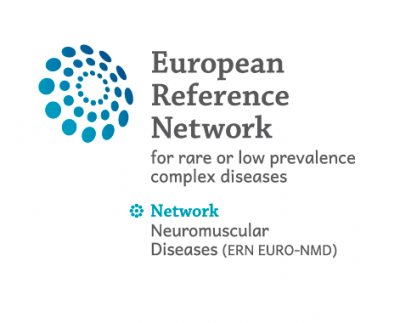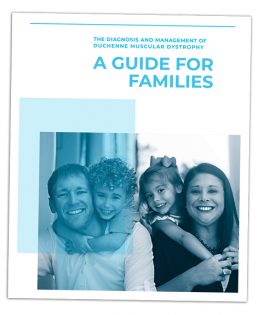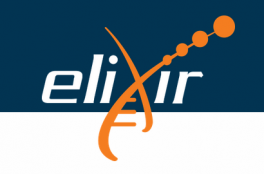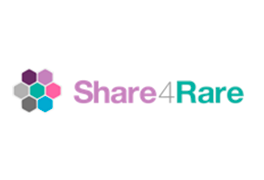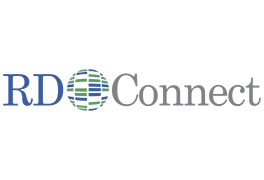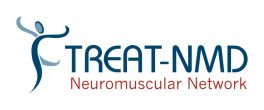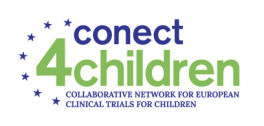|
| |
EURO-NMD second annual meeting
Our second annual meeting will take place in 29-30 November 2019, in Prague, Czech Republic and we are in the process of finalising what promises to be an interesting and informative program.
Registration is now open to everyone who is keen to find out more about our ERN and the fee is €150. Each Board Member and Executive Committee Member has been allocated one free place and will be eligible to claim a travel and accommodation bursary. Information about how to claim this bursary will be sent to each eligible participant via email.
|
|
|
|
| |
Duchenne muscular dystrophy - new care 'Guide for Families' available to download
Using updated recommendations, The Muscular Dystrophy Association USA, Parent Project Muscular Dystrophy, TREAT-NMD and the World Duchenne Organisation UPPMD have again worked together to produce a current and comprehensive Duchenne Guide for Families ensuring that the very latest in care standards are accessible to all people living with Duchenne.
The 2018 Duchenne Guide for Families replaces the previous version and is now available in both UK and US English.
To ensure as many people as possible have access, TREAT-NMD and World Duchenne Organisation UPPMD are working with the international Duchenne community to provide translations into a number of languages. As soon as these are completed, we will upload them here. A number of translations are already underway largely thanks to the motivation and dedication of our patient community.
In the meantime, the guide can be downloaded in both UK and US English.
If you have any questions about the translation of the Duchenne Guide for Families please contact Cathy Turner or Elizabeth Vroom.
|
|
|
|
|
| |
ELIXIR releases annual report 2017
ELIXIR, the European infrastructure which unites life science resources such as databases, software tools, training materials, cloud storage and supercomputers, publised its 2017 annual report during the summer.
Financed by the H2020 Project ELIXIR-EXCELERATE. A survey was carried out to constitute a catalogue of resources data sources and methods useful for the RD research community: over 100 resources and analysis tools were detected and have now been added to the ELIXIR Service and Tools registry (bio.tools) in a special “rare diseases” collection.
|
|
|
|
|
| |
Keeping up-to-date with Share4Rare
The first Share4Rare newsletter is planned for the end of September.
Please Subscribe here to receive the newsletter and learn more about this collaborative project to develop a platform for rare disease patients and their families.
The 3rd patient-powered co-design workshop for the Share4Rare platform took place in Barcelona in July. A summary of the goals and outcomes of the workshop can be found on the S4R website. The S4R project has received funding from the European Union’s H2020 research and innovation programme under grant agreement No 780262
|
|
|
|
|
| |
New video tutorials on the RD-Connect Genome-Phenome
Analysis Platform
RD-Connect is working on releasing a series of video tutorials explaining how to use the different features of their Genome-Phenome Analysis Platform to analyse sequencing data and identify disease-causing genetic variants. In the last few weeks, they have released the first four videos are as follows:
More video tutorials are coming soon!
|
|
|
|
|
| |
Upcoming RD-Connect webinars
Finding registries and biosamples in just a few clicks: RD-Connect Registry & Biobank Finder and Sample Catalogue
Mary Wang, Fondazione Telethon, Milan, Italy
Tuesday 18 September 2018, 15:00 CEST
This webinar will demonstrate how to use two tools that will help you quickly identify patient registries in Europe and beyond that hold data on your disease of interest. They also let you find rare disease biobanks and browse their sample collections, with detailed information about each individual sample.
Linking up all those data: why should we make data FAIR
Marco Roos, Leiden University Medical Center, The Netherlands
Wednesday 26 September 2018, 15:00 CEST
Register your interest here
The webinar will explain what makes data Findable, Accessible, Interoperable and Reusable (FAIR) and why it is critical that different types of information, such as medical records, clinical and phenotypic data, test results, sequencing data and biosample details are made FAIR at the source.
|
|
|
|
| |
VISION-DMD organises workshop
VISION-DMD are organising a scientific workshop on Advances in Biomarkers and Imaging in clinical trial design for DMD and other Neuromuscular Diseases. The workshop will take place in Prague immediately before our annual meeting on the 29th November 9am to 11.25am, at the same venue as the EURO-NMD Annual meeting and is free to attend.
|
|
|
|
|
|
| |
World leading experts to deliver SMA masterclass
TREAT-NMD are delighted to announce the first SMA Expert Masterclass. It will take place Monday 19th and Tuesday the 20th of November in central Rome, Italy. The masterclass will be co-chaired by Professor Eugenio Mercuri and Professor Nathalie Goemans. The debilitating nature of Spinal Muscular Atrophy (SMA) means that timely diagnosis and effective care…
|
|
|
|
|
| |
Global collagen 6 registry launches
A new registry for the Collagen 6 related dystrophies has been launched and is currently accepting registrations in English.
This new global registry is a database for individuals who have been diagnosed with Bethlem Myopathy, Ullrich Congenital Muscular Dystrophy (UCMD) or an intermediate form of these diseases. Based at the John Walton Muscular Dystrophy Research Centre at Newcastle University, UK this new registry is part of the TREAT-NMD alliance global network of registries. The registry has been developed in partnership with a number of leading neuromuscular researchers and is funded by the Collagen VI Alliance.
|
|
|
|
|
| |
Myotonic Dystrophy Foundation – Funding call for the Development of a Genome Editing Strategy for Myotonic Dystrophy Type 1
The Myotonic Dystrophy Foundation (MDF) is pleased to announce a Request for Applications (RFA) for the Development of a Genome Editing Strategy for Myotonic Dystrophy Type 1 (DM1). Through this RFA, MDF recognizes a need to advance genome editing technology and evaluate its potential as a therapy for use in DM1.
|
|
|
|
|
| |
conect4children - call for proposals for multinational clinical trials of medicinal products
c4c invites clinical trials of medicinal products (CTIMPs) that will answer focused research questions to improve understanding of one or more medicine used by neonates, children and young people in Europe. This grant is designed to fund studies that are “proof-of-viability” studies for the new c4c network. All paediatric specialties and all paediatric age-groups…
|
|
|
|
|
| |
Centronuclear myopathy - publication highlight
An integrated modelling methodology for estimating the prevalence of centronuclear myopathy
Authors : I Vandersmissen, V Biancalana, L Servais, JJ Dowling, G Vander Stichele, S Van Rooijen, L Thielemans
Published : June 2018
Abstract : Centronuclear myopathies (CNM) are a group of rare inherited muscular disorders leading to a significantly reduced quality of life and lifespan. To date, CNM epidemiologic reports provide limited incidence and prevalence data. Here, an integrated model utilizing available literature is proposed to obtain a better estimate of overall CNM patient numbers by age, causative gene, severity and geographic region.
This model combines published epidemiology data and extrapolates limited data over CNM subtypes, resulting in patient numbers related to age and disease subtype. Further, the model calculates a CNM incidence twofold the current estimates. The estimated incidence of 17 per million births for severe X-linked myotubular myopathy (XLMTM), the main subtype of CNM, corresponds to an estimated prevalence of 2715 in the US, 1204 in the EU, 688 in Japan and 72 in Australia. In conclusion, the model provides an estimate of the CNM incidence, prevalence and survival, and indicates that the current estimates do not fully capture the true incidence and prevalence. With rapid advances
in genetic therapies, robust epidemiologic data are needed to further quantify the reliability of incidence, prevalence and survival rates for
the different CNM subtypes.
Journal : Neuromuscular Disorders 000 (2018) 1–12
DOI : https://doi.org/10.1016/j.nmd.2018.06.012
|
|
|
|
